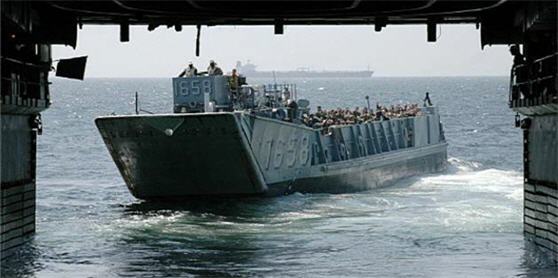
Much attention has been given to the ways militaries are changing focuses on the ground forces, which conduct peacekeeping, stability operations, and counterinsurgency. After all, NATO countries have more than 200,000 soldiers and marines deployed in Iraq and Afghanistan. These ground forces have learned the hard lessons of stability operations and are re-equipping with new uniforms, vehicles better suited for terrain and IED-defense, and more nimble surveillance and reconnaissance assets. For ground forces, change is necessary not only for success, but also survival.
Meanwhile, naval forces are attempting to change too. NATO, EU, and US-led naval coalitions around the world are providing port security, patrolling strategic lanes of communication, and combating piracy. These are very different missions from what their warships were designed for and they are proving to be ill-suited to reduce maritime insecurity brought by non-state actors. Pirates in the Gulf of Aden still seize ships, as evidenced by the Greek freighter hijacked over the weekend. Drug traffickers still transit cocaine from South America to North America and Europe. And smugglers still illegally move people from Africa to Europe. In contrast to ground forces, converting jets to helicopters or retiring destroyers for patrol craft is not feasible. The ships at sea today were designed with a 40-year life span in mind. While they are multi-purpose, non-state actors’ success illustrates the limits of naval power.
That said, multi-purpose ships are proving their worth on activities ashore to improve human security. In particular, amphibious ships are good platforms for providing humanitarian assistance. Their large deck space provides good staging areas for helicopters. Small boats designed for landing marines ashore are perfect for moving supplies into isolated areas where no adequate infrastructure exists. And their large medical bays, designed for treating battle casualties, can accommodate pediatricians, obstetricians, and family practice physicians to treat myriad illnesses.
That it’s not necessary to beat amphibs into hospital ships is being proven off the west coast of Africa today. The USS Nashville (LPD 13) has been serving as the “Africa Partnership Station.” The overall goal is to “help coastal nations in West and Central Africa achieve safety and security in the Gulf of Guinea.” With the motto, “one boat can make a difference,” Nashville is training with the militaries and coast guards of West Africa. The ship is providing humanitarian supplies but also supporting more traditional military missions. The international crew of Nashville offers courses in ocean data analysis, oil platform security, martial arts (semper fu?), non-lethal crowd control, and military decision-making.
Similar programs occur in the Western Hemisphere. USNS Comfort (T-AH 20) will depart on April 1st for a four-month deployment to Latin America and the Caribbean. Overseeing the operation is Rear Adm. Joseph D. Kernan, Naval Forces South/4th Fleet commander who said, “The team that has been assembled is diverse and brings together not only multiple U.S. armed forces and interagency representatives, but just as importantly, non-governmental organizations (NGOs) and partner nation representatives who bring a wealth of knowledge and resources to the team.” This is the fourth humanitarian and civic assistance mission to the region and follows Comfort’s 2007 deployment and the amphibious ships USS Boxer (LHD 4) and USS Kearsarge (LHD 3). In total, more than 169,000 patients have been treated and more than 1,500 surgeries completed during the three deployments.<
While these warships are not being used for war (a full complement of Marines is seldom embarked), operating these vessels in peacetime provides sailors critical experience in ship handling, maintenance, and operations. And it is well received by US Sailors and international participants. “This endeavor has been a very rewarding experience,” said Ensign Rene Juarez. “It is important to APS, I believe, in order to build long lasting relationships on personal and professional levels that will build a solid foundation for future cooperative agreements and partnerships.” For Juarez and others like him, maritime engagement is rewarding and a worthwhile break from conducting exercises.
Derek Reveron, an Atlantic Council contributing editor, is a professor of national security affairs at the U.S. Naval War College in Newport, RI. These views are his own. US Navy Photo by David Holmes.
Image: FPS-Navy-COIN.jpg
